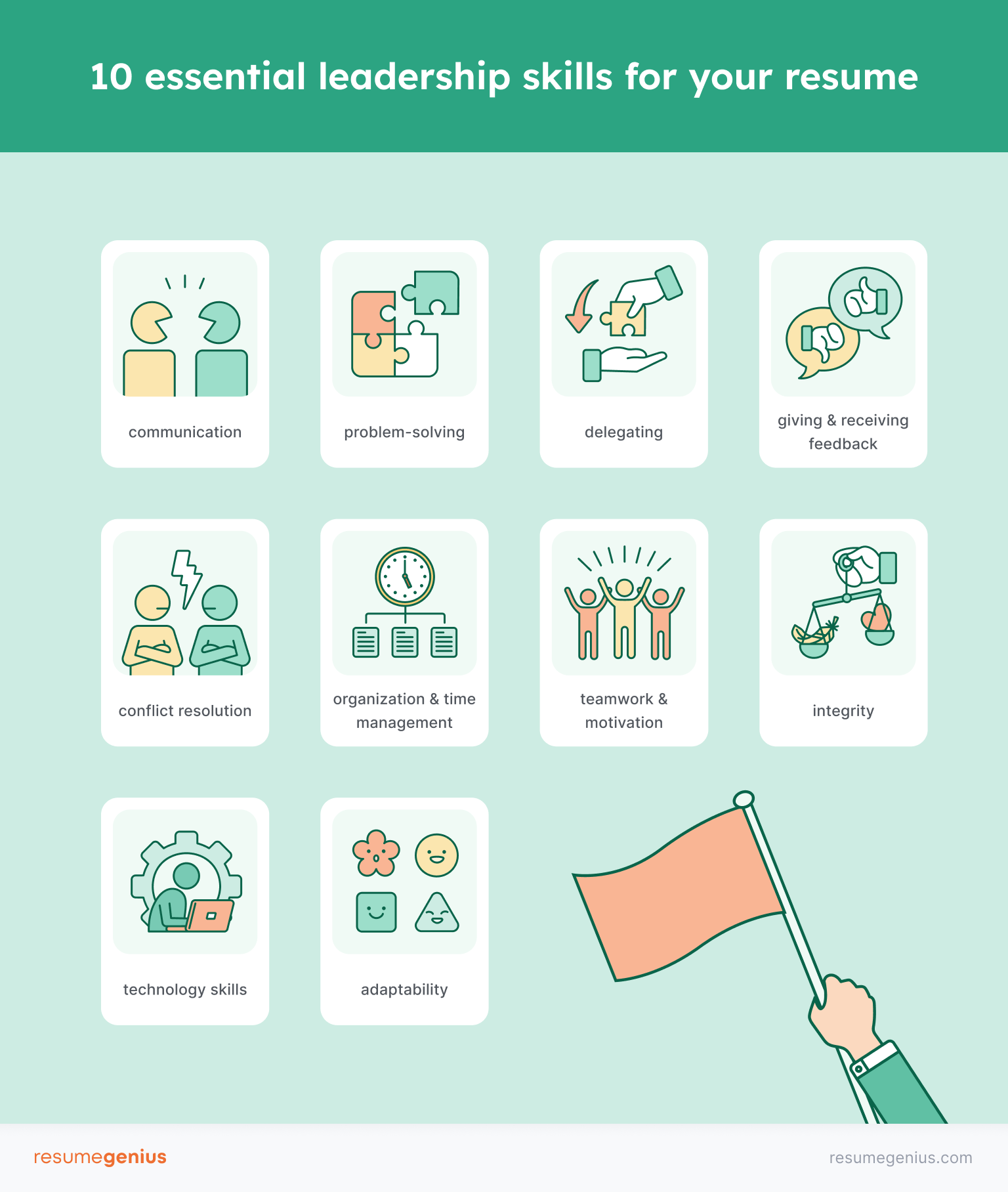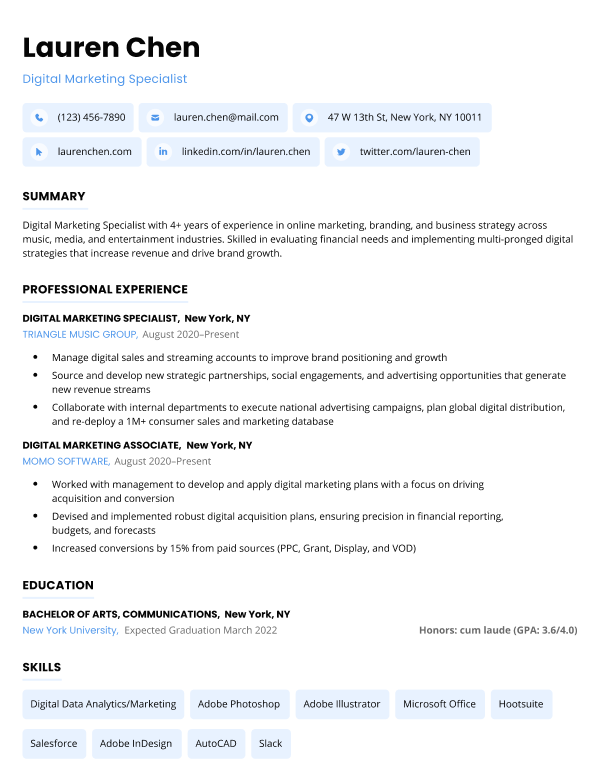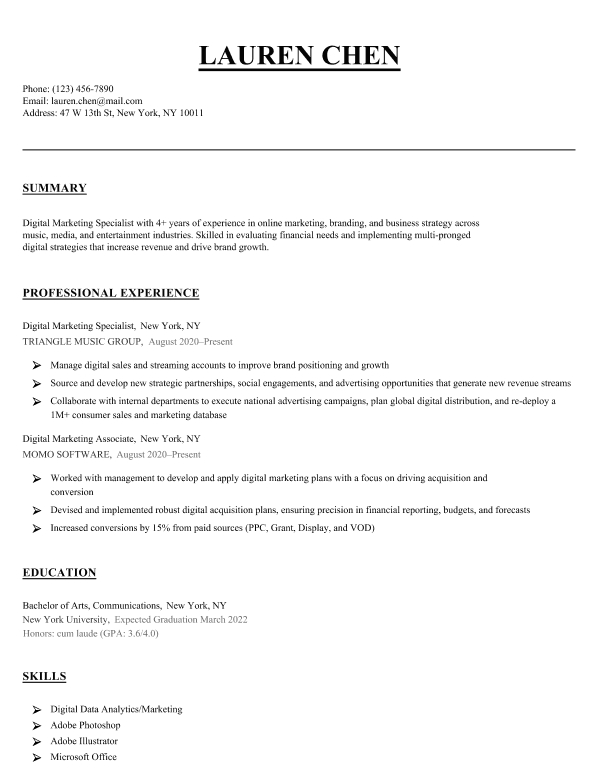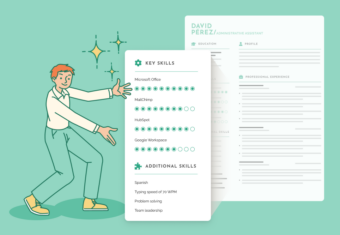Leadership skills are the skills necessary to organize people around a common goal. Like other skills for your resume, good leadership skills are essential for meeting individual, team, and organizational objectives.
Below is our comprehensive list of effective leadership skills and three writing tips to help you learn how to effectively showcase them when applying for jobs.
Our free-to-use resume builder can make you a resume in as little as 5 minutes. Just pick the template you want, and our software will format everything for you.
Communication
Effective leadership starts with great oral and written communication skills.
Good leaders can clearly convey vision and strategy across diverse audiences and listen attentively to different viewpoints. Highlighting communication skills on your resume shows that you can collaborate well and ensure that your team knows what’s expected of them.
Here’s an example of how to highlight this soft skill on your resume:
Streamlined communication on project completion progress through app development, resulting in an increase in customer satisfaction by 25%
Communication leadership skills list
- Public speaking
- Active listening
- Giving and receiving feedback
- Presenting
- Excellent non-verbal communication
Problem solving
Even the best leaders’ plans don’t always go smoothly. The ability to roll with the punches while remaining positive is essential, as is a knack for charting the best course forward.
As AI becomes more prevalent in the workplace, team leaders will need to tackle novel obstacles at an increasing rate. The ability to think critically and plan strategically are key skills to help teams succeed in the face of these new hurdles.
Here’s an example of how to include your problem solving skills on your resume:
Coordinated with IT department to improve user functionality of e-commerce app, easing order processing and increasing annual company revenue by 10%
Problem-solving leadership skills list
- Flexibility
- Creativity
- Critical thinking
- Analysis
- Research
- Evaluation
Delegation
When you manage people and projects, you must ensure all necessary tasks are completed by the deadline. You’ll need to properly delegate workloads to keep your team productive, with realistic expectations on timelines needed to complete projects.
Here’s an example of how to highlight your delegation-related leadership skills on your resume:
Managed a team of 5 sales associates, assigning tasks and customer clients based on company needs and workloads
Delegation leadership skills list
- Organization
- Strategic thinking
- Forecasting
- Scheduling
- Attention to detail
- Excellent oral and written communication
Giving & receiving feedback
Effective leaders must strike a balance between offering encouragement and providing constructive feedback. Knowing how to give and receive feedback professionally and positively is an essential leadership skill.
Here’s an example of how to demonstrate your ability to give and receive feedback on your resume:
Held company-wide feedback and sharing sessions twice a month, developed solutions to employee complaints regarding health benefits and office work hours
Feedback leadership skills list
- Excellent written and oral communication
- Conflict resolution
- Interpersonal skills
- Active listening
- Empathy
Conflict Resolution
Conflicts can occur in any professional setting. A good leader knows that conflict undermines morale and productivity, and that even minor disputes shouldn’t go unaddressed.
Being able to take a conflict and resolve it in a way where everyone involved feels that they were heard, understood, and respected is a valuable skill that employers appreciate.
Here’s an example of how to showcase conflict resolution skills on your resume:
Led and mentored a team of 10 retail associates. Resolved several disputes by facilitating team-building exercises and weekly meetings where employees could discuss issues and voice their opinions.
Conflict resolution leadership skills list
- Active listening
- Emotional intelligence
- Teamwork
- Professionalism
- Mediation
- Negotiation
- Patience
Organization & time management
Being a leader means juggling tasks, prioritizing deadlines, and monitoring progress, all while supervising and managing a team.
Being a successful, strong leader means having excellent time management skills and organizational skills.
Here’s an example of how to highlight your organizational and time management skills on your resume:
Managed a team of 20 writers while working remotely. Delegated tasks and monitored progress, ensuring publication deadlines were met. Exceeded annual distribution goals by 20%.
Organization & time management leadership skills list
- Planning
- Financial forecasting
- Decision making
- Delegation
- Flexibility
- Attention to detail
Teamwork & motivation
Good leaders understand that they can’t complete every project or task alone, which is why teamwork skills are essential.
If your team’s morale is low, projects won’t get done efficiently. That’s why effective leadership involves knowing how and when to motivate your team to meet timelines and produce quality work.
Here’s an example of how to include your teamwork and motivational skills on your resume:
Led and mentored a team of 20 security guards. Held bi-weekly team-building sessions, encouraging members to share any concerns about security flaws with the group
Teamwork & motivation leadership skills list
- Collaboration
- Problem solving
- Relationship building
- Constructive feedback
- Organization
- Delegation
- Mentoring
- Encouragement
Integrity
Integrity means being honest, dependable, and accountable for your actions. Leaders who display integrity at their workplace make ethical choices and keep a positive attitude, setting a good example for their team.
Here’s an example of how to showcase integrity on your resume:
Mentored a team of 5 nurses, ensuring patient care and quality of medical treatment were consistently upheld and that incoming hospital guests were treated with respect
Integrity leadership skills list
- Trustworthiness
- Dependability
- Honesty
- Ethics
- Accountability/Reliability
- Confidentiality
- Loyalty
Adaptability
With technology advancing so quickly, adapting to unexpected situations and finding innovative solutions is essential for any leader.
The integration of AI into business operations requires leaders who can nimbly adjust to new technologies and processes. Adaptable leaders who can assess changes brought by AI and rapidly implement the necessary training, workflow revisions and policy updates will have a competitive edge in today’s environment.
Here’s an example of how to display your adaptability on your resume:
Transitioned to remote-based managerial work. Exceeded yearly sales targets through online training sessions and weekly team meetings designed to improve team members’ sales techniques.
Adaptability leadership skills list
- Flexibility
- Problem-solving
- Technological capabilities
- Calm under pressure
- Organization
- Strategic thinking
Technology skills
A big part of leading innovation and growth initiatives is knowing how to use technology to your advantage.
Leaders need to be tech-savvy, know how to use industry-specific technology, and be able to train their teams on how to use it.
Also, as hybrid and remote work models become increasingly common, employees now connect and collaborate across more communication channels than ever before. With less in-person interaction, it’s crucial for leaders to communicate effectively across these digital platforms to collaborate with and motivate their teams.
Here’s an example of how to showcase your technical skills in your work experience section:
Led training on Loom to create how-to videos for onboarding new hires across multiple locations, reducing onboarding time by 30%
Technology leadership skills list
- Video calling platforms like Zoom, Google Meet, MS Teams, etc.
- Slack
- Loom
- Google Drive
- Trello
- Asana
- Basecamp
- Atlassian (Jira and Confluence)
- Figma
- Software troubleshooting
3 additional tips for showcasing your leadership skills
Now that you have a good understanding of common leadership skills and how to display them on your resume, here are three additional tips to help you on your job hunt:
1. Discuss your leadership skills in your cover letter
Any experience that highlights your leadership abilities — especially recent and relevant experience — is worth including in your cover letter.
Your cover letter is an opportunity to elaborate how you applied your leadership skills in previous roles.
Discussing your experience managing teams or guiding projects establishes you as a capable leader who can effectively direct people and oversee complex projects.
2. Quantify your leadership experience on your resume
While simply listing your leadership abilities on your resume can be effective, hiring managers will be more impressed if you quantify your accomplishments.
Adding hard numbers to your work experience bullet points helps describe exactly how you’ve applied your leadership skills in previous roles.
Here’s an example:
Leveraged project management, influence and analytical skills to build consensus across departments on new content localization processes, reducing launch times by 35%
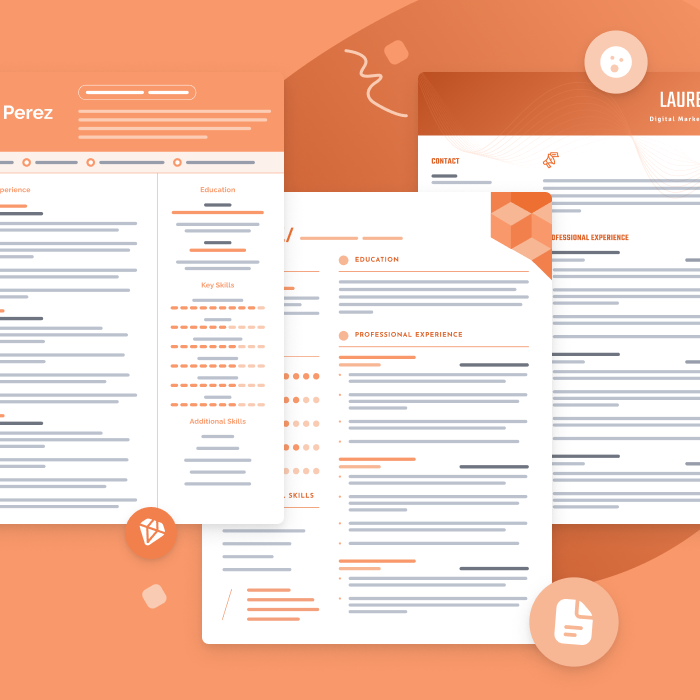
The best resume templates for 2024
One of the best ways to make your resume is by filling out one of our free resume templates. All our templates are designed by experts and free to download for Microsoft Word or Google Docs.
3. Prepare to back up your claims in the interview
Many of the details you include in your resume will come up in your interview.
Interviewers will likely ask about team size, goals, challenges, final outcomes of projects, and initiatives mentioned on your resume. Discussing how you applied your leadership skills in detail proves you have the experience to take the reins and excel in your next role.
As you write your resume, make sure to single out examples of leadership skills you can back up in person.
Click to rate this article
4.6 Average rating



